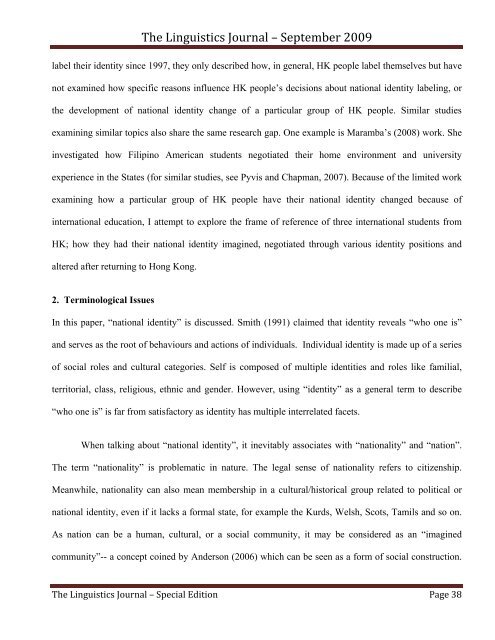The Linguistics Journal September 2009 Special Edition Language
The Linguistics Journal September 2009 Special Edition Language
The Linguistics Journal September 2009 Special Edition Language
Create successful ePaper yourself
Turn your PDF publications into a flip-book with our unique Google optimized e-Paper software.
<strong>The</strong> <strong>Linguistics</strong> <strong>Journal</strong> – <strong>September</strong> <strong>2009</strong><br />
label their identity since 1997, they only described how, in general, HK people label themselves but have<br />
not examined how specific reasons influence HK people’s decisions about national identity labeling, or<br />
the development of national identity change of a particular group of HK people. Similar studies<br />
examining similar topics also share the same research gap. One example is Maramba’s (2008) work. She<br />
investigated how Filipino American students negotiated their home environment and university<br />
experience in the States (for similar studies, see Pyvis and Chapman, 2007). Because of the limited work<br />
examining how a particular group of HK people have their national identity changed because of<br />
international education, I attempt to explore the frame of reference of three international students from<br />
HK; how they had their national identity imagined, negotiated through various identity positions and<br />
altered after returning to Hong Kong.<br />
2. Terminological Issues<br />
In this paper, “national identity” is discussed. Smith (1991) claimed that identity reveals “who one is”<br />
and serves as the root of behaviours and actions of individuals. Individual identity is made up of a series<br />
of social roles and cultural categories. Self is composed of multiple identities and roles like familial,<br />
territorial, class, religious, ethnic and gender. However, using “identity” as a general term to describe<br />
“who one is” is far from satisfactory as identity has multiple interrelated facets.<br />
When talking about “national identity”, it inevitably associates with “nationality” and “nation”.<br />
<strong>The</strong> term “nationality” is problematic in nature. <strong>The</strong> legal sense of nationality refers to citizenship.<br />
Meanwhile, nationality can also mean membership in a cultural/historical group related to political or<br />
national identity, even if it lacks a formal state, for example the Kurds, Welsh, Scots, Tamils and so on.<br />
As nation can be a human, cultural, or a social community, it may be considered as an “imagined<br />
community”-- a concept coined by Anderson (2006) which can be seen as a form of social construction.<br />
<strong>The</strong> <strong>Linguistics</strong> <strong>Journal</strong> – <strong>Special</strong> <strong>Edition</strong> Page 38


